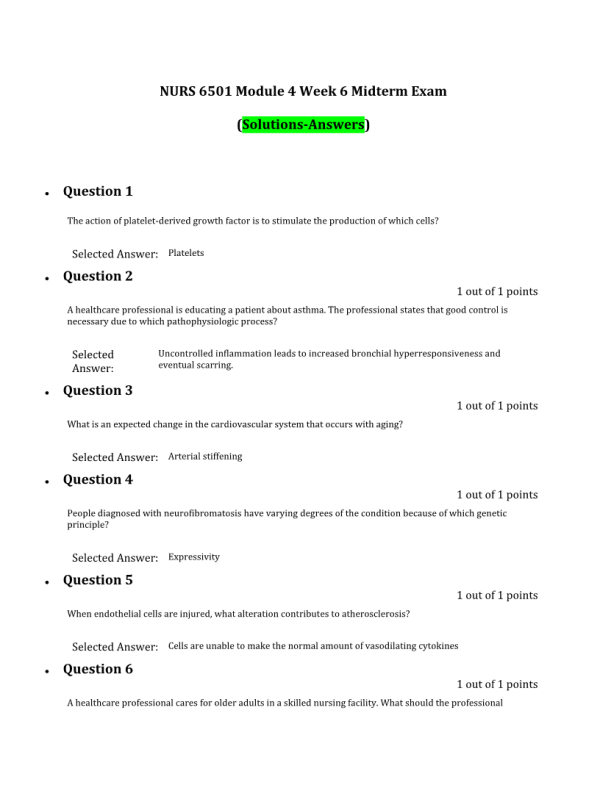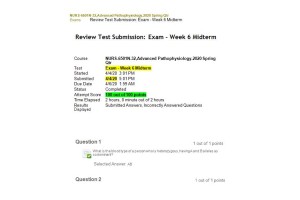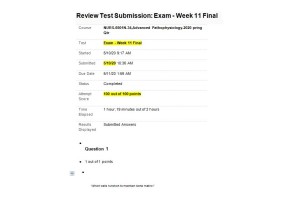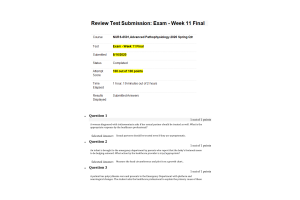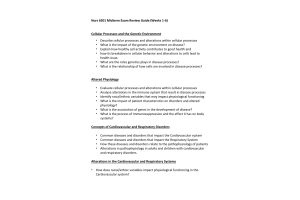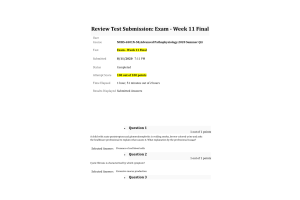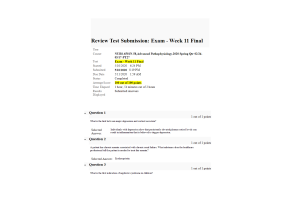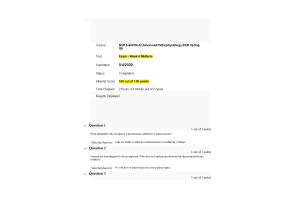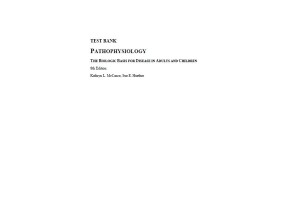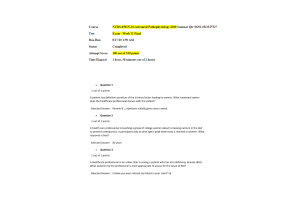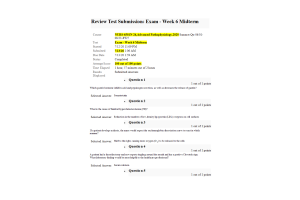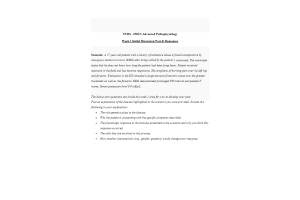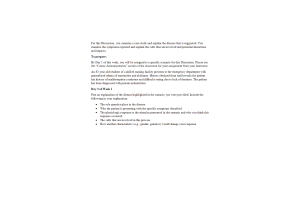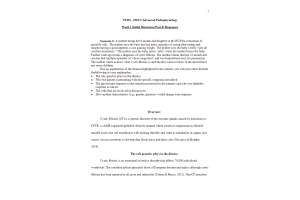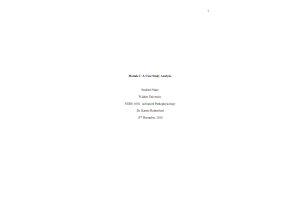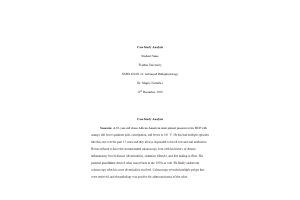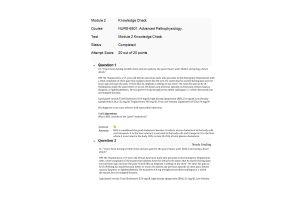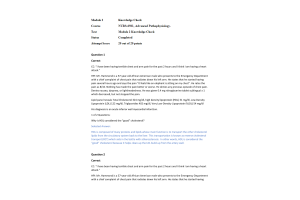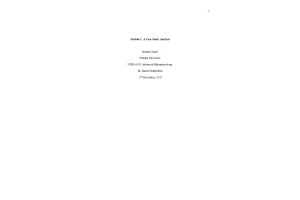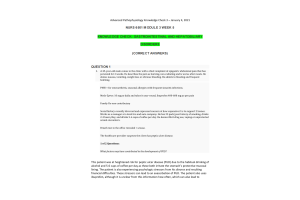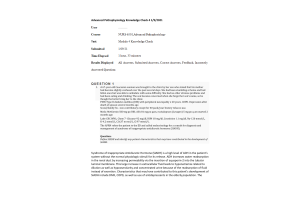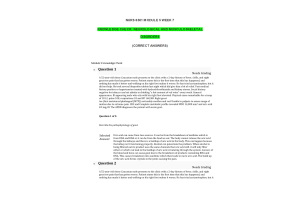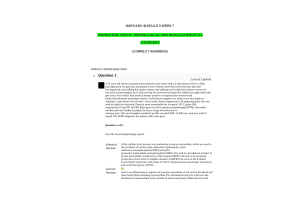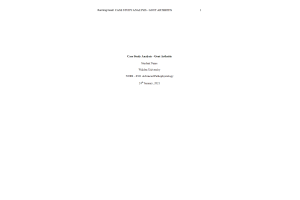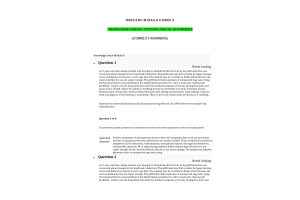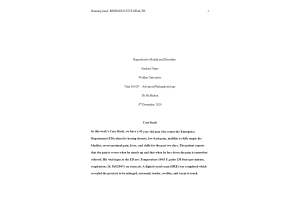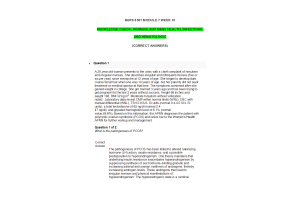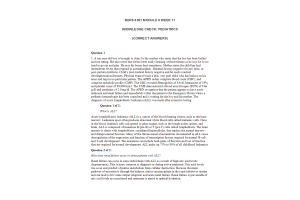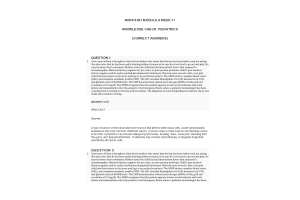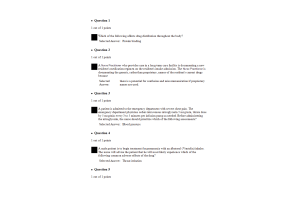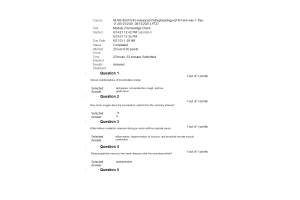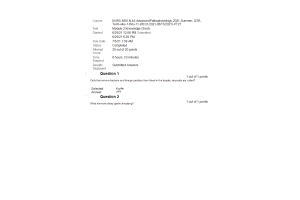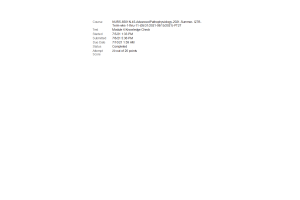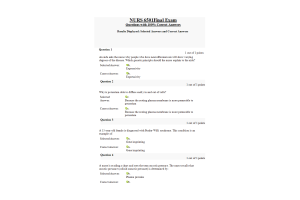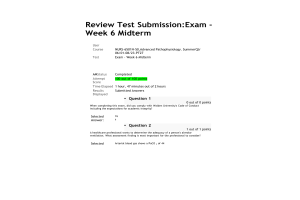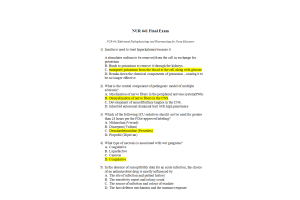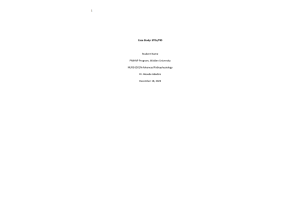NURS 6501 Week 6 Midterm Exam
- $39.00
- Question: The action of platelet-derived growth factor is to stimulate the production of which cells?
- Question: A healthcare professional is educating a patient about asthma. The professional states that good control is necessary due to which pathophysiologic process?
- Question: What is an expected change in the cardiovascular system that occurs with aging?
- Question: People diagnosed with neurofibromatosis have varying degrees of the condition because of which genetic principle?
- Question: When endothelial cells are injured, what alteration contributes to atherosclerosis?
- Question: A healthcare professional cares for older adults in a skilled nursing facility. What should the professional assess for in these individuals related to cardiovascular functioning?
- Question: What physical sign does the healthcare professional relate to the result of turbulent blood flow through a vessel?
- Question: What are tumor cell markers?
- Question: Once they have penetrated the first line of defense, which microorganisms do natural killer (NK) cells actively attack?
- Question: Which gastric hormone inhibits acid and pepsinogen secretion, as well as decreases the release of gastrin?
- Question: What is the single most common cause of cellular injury?
- Question: A professor has taught the students about the sources of increased ammonia in patients with hepatic encephalopathy. What statement by a student indicates the professor should review this material?
- Question: Surfactant produced by type II alveolar cells facilitates alveolar distention and ventilation by which mechanism?
- Question: A patient is brought to the Emergency Department with a gunshot wound to the chest. The healthcare professional assesses an abnormality involving a pleural rupture that acts as a one-way valve, permitting air to enter on inspiration but preventing its escape by closing during expiration. What action by the healthcare professional is the priority?
- Question: What is the only surface inside the nephron where cells are covered with microvilli to increase the re-absorptive surface area called?
- Question: A patient is having an IE-mediated hypersensitivity reaction. What action by the healthcare professional is best?
- Question: A patient has been diagnosed with a renal stone. Based on knowledge of common stone types, what self-care measure does the healthcare professional plan to teach the patient when stone analysis has returned?
- Question: Which hormone is required for water to be reabsorbed in the distal tubule and collecting duct?
- Question: The cardiac electrical impulse normally begins spontaneously in the sinoatrial (SA) node because of what reason?
- Question: What is one function of the tumor cell marker?
- Question: When comparing the clinical manifestations of both diabetic ketoacidosis (DKA) and hyperglycemic hyperosmolar nonketotic syndrome (HHNKS), which condition is associated with only DKA?
- Question: Which cAMP-mediated response is related to antidiuretic hormone?
- Question: The student wants information about a patient's renal function. What test does the healthcare professional tell the student to evaluate?
- Question: What is the most important cause of pulmonary artery constriction?
- Question: In teaching a women's community group, which risk factor does the healthcare professional teach is related to high morbidity of cancer of the colon, uterus, and kidney?
- Question: A healthcare professional is caring for four patients. Which patient does the professional assess for pulmonary emboli (PE) as the priority?
- Question: What is the second most commonly recognized genetic cause of intellectual disability?
- Question: A person has acne, easy bruising, thin extremities, and truncal obesity. The healthcare professional assesses the person for which of these?
- Question: What is the cause of functional dysphagia?
- Question: What effect is a result of inhibiting the parasympathetic nervous system with a drug such as atropine?
- Question: Renal failure is the most common cause of which type of hyperparathyroidism?
- Question: A healthcare professional wants to determine the adequacy of a person's alveolar ventilation. What assessment finding is most important for the professional to consider?
- Question: The acute inflammatory response is characterized by fever that is produced by the hypothalamus being affected by what?
- Question: A healthcare professional is caring for four patients. Which patient does the professional assess for neurogenic diabetes insipidus (DI)?
- Question: Within a physiologic range, what does an increase in left ventricular end-diastolic volume (preload) result in?
- Question: Which patient would the healthcare professional assess for elevated levels of antidiuretic hormone (ADH) secretion?
- Question: A student asks why some vaccinations are given orally and some are given by injection. What response by the professor is best?
- Question: The Bainbridge reflex is thought to be initiated by sensory neurons in which cardiac location?
- Question: A healthcare professional is caring for four patients. Which patient should the professional assess for hyperkalemia?
- Question: What is the role of the normal intestinal bacterial flora?
- Question: A patient diagnosed with diabetic ketoacidosis (DKA) has the following laboratory values: arterial pH 7.20; serum glucose 500 mg/dL; positive urine glucose and ketones; serum potassium (K +) 2 mEq/L; serum sodium (Na +) 130 mEq/L. The patient reports that he has been sick with the flu for 1 week. What relationship do these values have to his insulin deficiency?
- Question: A student asks the professor how a faulty negative-feedback mechanism results in a hormonal imbalance. What response by the professor is best?
- Question: A healthcare provider notes that tapping the patient's facial nerve leads to lip twitching. What electrolyte value is correlated with this finding?
- Question: A patient is having a spirometry measurement done and asks the healthcare professional to explain this test. What response by the professional is best?
- Question: Which characteristic is the most important determinant of immunogenicity when considering the antigen?
- Question: Which renal change is found in older adults?
- Question: If a patient develops acidosis, the nurse would expect the oxyhemoglobin dissociation curve to react in which manner?
- Question: Under anaerobic conditions, what process provides energy for the cell?
- Question: A patient suffered multiple traumatic injuries and received many blood transfusions within a few days of the injuries. For which medical condition should the healthcare professional monitor the patient for?
- Question: The student asks the professor to explain what characteristic is demonstrated by lungs with decreased compliance?
- Question: What is one function of the tumor cell marker?
- Question: Vaccinations are able to provide protection against certain microorganisms because of what?
- Question: A student asks the healthcare professional to describe exotoxins. Which statement by the professional is best?
- Question: A class of students has learned about contributing factors to duodenal ulcers. What statement indicates to the professor that the students need a review?
- Question: A healthcare professional is caring for a patient who has a delay in electrical activity reaching the ventricle as seen on ECG. What ECG finding would the healthcare professional associate with this problem?
- Question: How do free radicals cause cell damage?
- Question: What causes the edema that occurs during the inflammatory process?
- Question: A student learns what information about acute pancreatitis?
- Question: A student asks why carbon monoxide causes tissue damage. What response by the professor is best?
- Question: The healthcare professional working with older adults teaches general infection-prevention measures as a priority for this age group due to which change in lymphocyte function?
- Question: A healthcare professional is caring for a patient who has continuous increases in left ventricular filing pressures. What disorder would the professional assess the patient for?
- Question: Why is leakage of lysosomal enzymes during chemical injuries significant?
- Question: A patient has diabetes mellitus. A recent urinalysis showed increased amounts of protein. What therapy does the healthcare provider educate the patient that is specific to this disorder?
- Question: A student asks the professor to explain what effect natriuretic peptides have during heart failure when the heart dilates. Which response by the professor is best?
- Question: Which type of immunity is produced by an individual after either natural exposure to the antigen or after immunization against the antigen?
- Question: A patient has a history of excessive use of magnesium-containing antacids and aluminum-containing antacids. What lab value does the healthcare professional correlate to this behavior?
- Question: A student asks the healthcare professional to explain the function of the papillary muscles. What response by the professional is best?
- Question: A healthcare professional is assessing a child whose parents report poor grades in school, trouble paying attention, and naughty behaviors that have become so frequent the child is always in trouble. For which health condition should the professional facilitate testing?
- Question: The pathophysiologic process of edema is related to which mechanism?
- Question: During the cardiac cycle, why do the aortic and pulmonic valves close after the ventricles relax?
- Question: A patient's urinalysis came back positive for glucose. What does the healthcare professional expect the patient's blood glucose to be at a minimum?
- Question: The student asks the healthcare professional to explain how pulmonary edema and pulmonary fibrosis cause hypoxemia. What description by the professional is best?
- Question: What does vomiting-induced metabolic alkalosis cause?
- Question: What pathologic change occurs to the kidney's glomeruli as a result of hypertension?
- Question: A patient has a peptic ulcer related to h. pylori bacteria. What treatment does the healthcare professional educate the patient on?
- Question: A patient is in severe shock and is receiving vasopressin. A student asks the health care professional to explain the rationale for this treatment. What response by the professional is most accurate?
- Question: What is apoptosis?
- Question: Free radicals play a major role in the initiation and progression of which diseases?
- Question: An amniocentesis indicates a neural tube defect when an increase in which protein is evident?
- Question: A patient had a thyroidectomy and now reports tingling around the mouth and has a positive Chvostek sign. What laboratory finding would be most helpful to the healthcare professional?
- Question: A patient's chart indicates Kussmaul respirations. The student asks the healthcare professional what this is caused by. What response by the professional is most accurate?
- Question: A pregnant woman has Graves disease. What test/s does the healthcare professional advise the woman about?
- Question: A healthcare professional is assessing a child who has complete trisomy of the twenty-first chromosome. What findings does the professional relate to this condition?
- Question: Where is two thirds of the body's water found?
- Question: A healthcare professional is working with a person who drinks several 6-packs of beer a week. What testing does the professional encourage the person to get?
- Question: After a partial gastrectomy, gastric bypass, or pyloroplasty, clinical manifestations that include increased pulse, hypotension, weakness, pallor, sweating, and dizziness are the results of which mechanism?
- Question: A patient has portal hypertension-induced splenomegaly. Which lab value would the healthcare professional associate with this condition?
- Question: Oxygenated blood flows through which vessel?
- Question: A student studying biology asks the professor to describe how the ras gene is involved in cancer proliferation. What explanation by the professor is best?
- Question: What is the blood type of a person who is heterozygous, having A and B alleles as codominant?
- Question: The healthcare professional explains to a student that the amount of volume of blood in the heart is directly related to the _____ of contraction.
- Question: Which statement is true about phagocytosis?
- Question: Which primary characteristic is unique for the immune response?
- Question: A professor has taught a student about skeletal alterations seen in chronic kidney disease. Which statement by the student indicates the professor needs to give more information?
- Question: A patient reports dumping syndrome after a partial gastrectomy. What does the healthcare professional teach this patient?
- Question: What is the process that ensures mitral and tricuspid valve closure after the ventricles are filled with blood?
- Question: The professors' response would be that Type 2 is best described as what?
- Question: What organic compound facilitates transportation across cell membranes by acting as receptors, transport channels for electrolytes, and enzymes to drive active pumps?
- Question: What is the major determinant of the resistance that blood encounters as it flows through the systemic circulation?
- Question: A patient has been admitted for a possible small intestinal obstruction. What is the first sign the healthcare professional assesses for that would indicate the presence of this condition?
- Question: When completing this exam, did you comply with Walden University's Code of Conduct including the expectations for academic integrity?
